雅思阅读中不容忽视的各种从句
雅思阅读中的定语从句
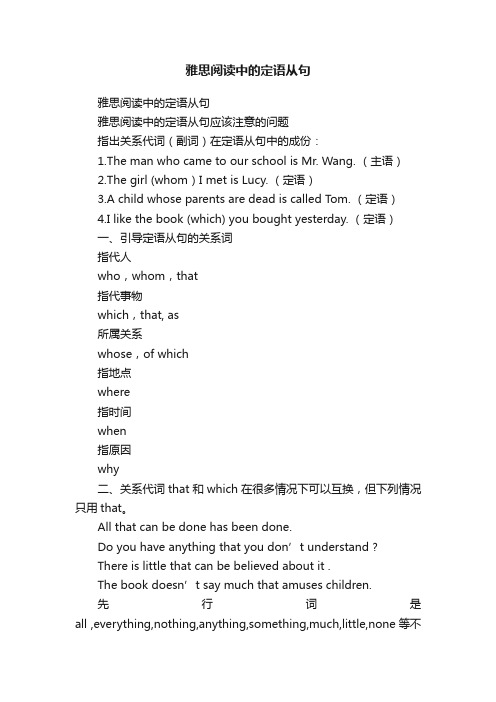
雅思阅读中的定语从句雅思阅读中的定语从句雅思阅读中的定语从句应该注意的问题指出关系代词(副词)在定语从句中的成份:1.The man who came to our school is Mr. Wang. (主语)2.The girl (whom)I met is Lucy. (定语)3.A child whose parents are dead is called Tom. (定语)4.I like the book (which) you bought yesterday. (定语)一、引导定语从句的关系词指代人who,whom,that指代事物which,that, as所属关系whose,of which指地点where指时间when指原因why二、关系代词that和which在很多情况下可以互换,但下列情况只用that。
All that can be done has been done.Do you have anything that you don’t understand ?There is little that can be believed about it .The book doesn’t say much that amuses children.先行词是all ,everything,nothing,anything,something,much,little,none等不定代词,引导定语从句用that 。
Hamb urg is the most beautiful city that I’ve ever seen.This is the best TV that is made in China.The first museum that he visited in China was the History Museum.先行词被形容词最高级或序数词修饰时,引导定语从句用that 。
雅思阅读之常见的重点句型归纳总结

雅思阅读之常见的重点句型归纳总结1.强调句:强调某个特定的信息或观点,通常用“It is ... that ...”或“It is only ... which ...”等句型来表达。
例如:“It is only through cultural experience that one can truly understand the world in which they live.”2.倒装句:强调某个特定的信息或观点,通常用“... is it ... that ...”的句型来表达。
例如:“Only is it through cultural experience that one can truly understand the world in which they live.”3.比较句:用来描述两个事物的相同点和不同点,通常用“... as ...”或“... than ...”等句型来表达。
例如:“Cultural experience, as compared to cultural knowledge, plays a more important role in promoting cross-cultural understanding.”4.名词性从句:表达一个特定的观点或信息,通常用“What, Why, How, Whether ...”等引导的从句来表达。
例如:“What is important is not so much the knowledge one possesses but how one utilizes it.”5.条件句:表达一种假设情况,通常用“If ... were to do ...,then ...”或“If ..., would ..., then ...”等句型来表达。
例如:“If one were to travel to a foreign country, they would have to adapt to the new cultural environment.”掌握这些句型可以帮助考生更好地理解文章的主旨和细节,提高阅读速度和理解能力。
雅思阅读高分必备形容词性从句

雅思阅读高分必备形容词性从句有时定语从句中还有其他成分,介词则位于定语从句之中。
如:This is the engineer who he cooperated with in the project.先行词指人时,关系代词既可以用who, 也可以用that。
但关系代词在定语从句中用作主语时,多用主格who。
如:★ Beyond the practical need to make order out of chaos, the rise of the dictionaries is associated with the rise of the English middle class, who were anxious to define and circumscribe the various world to conquer.(persons, those, people等先行词多用关系代词who)★ It is Tom who should be punished.(在强调结构中,指人时多用who)★ The American zoologist Donald Griffin, who was largely responsible for the discovery of sonar in bats, coined the term ‘echolocation’ to cover both sonar and radar, whether used by animals or by human instruments.朗阁雅思培训中心分析认为,在下列情况中多用that, 而不用who或者which。
如:★ much (很多)little (很少)none (没有任何)everything (任何事情) +先行词 +thateverybody (任何人)nothing (没有任何)nobody (没有人)E.g. There is nothing in the world that can frighten him.★先行词前面有最高级形容词修饰时He is the most boring speaker that I have ever heard.This is the most interesting book that I have ever read.★先行词有以下代词或者有下列代词修饰时the firstthe lastthe onlythe same +先行词 +thatthe veryallanynoeveryE.g. This is the last chance that you have.This is the very thing that I lost yesterday.This is the first thing that he wants to do.You are the only friend that we have.He is the last person that Tom wants to see.He has told the police all that he knew.★前面已经有疑问词who或者which时E.g. Who that knows him will trust him?Which of these trains is the one that goes to Nanjing?Which is the bike that you have lost?★兼指人和物/事物时E.g. The man and the horse that fell into the river were drowned. Look at the girl and her dog that are crossing the bridge.在下列情况中则多用which。
带你了解雅思阅读复杂句型!
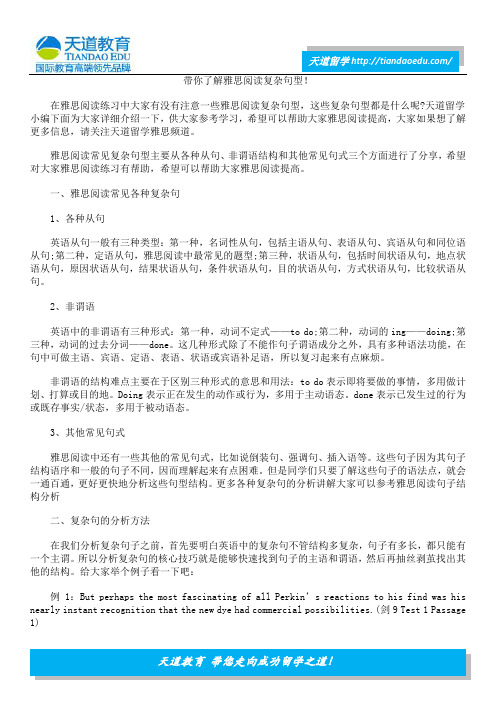
带你了解雅思阅读复杂句型!在雅思阅读练习中大家有没有注意一些雅思阅读复杂句型,这些复杂句型都是什么呢?天道留学小编下面为大家详细介绍一下,供大家参考学习,希望可以帮助大家雅思阅读提高,大家如果想了解更多信息,请关注天道留学雅思频道。
雅思阅读常见复杂句型主要从各种从句、非谓语结构和其他常见句式三个方面进行了分享,希望对大家雅思阅读练习有帮助,希望可以帮助大家雅思阅读提高。
一、雅思阅读常见各种复杂句1、各种从句英语从句一般有三种类型:第一种,名词性从句,包括主语从句、表语从句、宾语从句和同位语从句;第二种,定语从句,雅思阅读中最常见的题型;第三种,状语从句,包括时间状语从句,地点状语从句,原因状语从句,结果状语从句,条件状语从句,目的状语从句,方式状语从句,比较状语从句。
2、非谓语英语中的非谓语有三种形式:第一种,动词不定式——to do;第二种,动词的ing——doing;第三种,动词的过去分词——done。
这几种形式除了不能作句子谓语成分之外,具有多种语法功能,在句中可做主语、宾语、定语、表语、状语或宾语补足语,所以复习起来有点麻烦。
非谓语的结构难点主要在于区别三种形式的意思和用法:to do表示即将要做的事情,多用做计划、打算或目的地。
Doing表示正在发生的动作或行为,多用于主动语态。
done表示已发生过的行为或既存事实/状态,多用于被动语态。
3、其他常见句式雅思阅读中还有一些其他的常见句式,比如说倒装句、强调句、插入语等。
这些句子因为其句子结构语序和一般的句子不同,因而理解起来有点困难。
但是同学们只要了解这些句子的语法点,就会一通百通,更好更快地分析这些句型结构。
更多各种复杂句的分析讲解大家可以参考雅思阅读句子结构分析二、复杂句的分析方法在我们分析复杂句子之前,首先要明白英语中的复杂句不管结构多复杂,句子有多长,都只能有一个主谓。
所以分析复杂句的核心技巧就是能够快速找到句子的主语和谓语,然后再抽丝剥茧找出其他的结构。
雅思阅读之定语从句分析
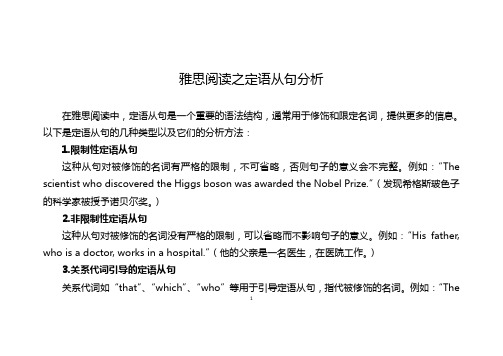
雅思阅读之定语从句分析在雅思阅读中,定语从句是一个重要的语法结构,通常用于修饰和限定名词,提供更多的信息。
以下是定语从句的几种类型以及它们的分析方法:1.限制性定语从句这种从句对被修饰的名词有严格的限制,不可省略,否则句子的意义会不完整。
例如:“The scientist who discovered the Higgs boson was awarded the Nobel Prize.”(发现希格斯玻色子的科学家被授予诺贝尔奖。
)2.非限制性定语从句这种从句对被修饰的名词没有严格的限制,可以省略而不影响句子的意义。
例如:“His father, who is a doctor, works in a hospital.”(他的父亲是一名医生,在医院工作。
)3.关系代词引导的定语从句关系代词如“that”、“which”、“who”等用于引导定语从句,指代被修饰的名词。
例如:“The1book that I borrowed from the library is very interesting.”(我从图书馆借来的书很有趣。
)4.关系副词引导的定语从句关系副词如“where”、“when”、“why”等也可以引导定语从句,用于修饰名词。
例如:“The reason why he was late for class was that he got up late this morning.”(他迟到的原因是他今天早上起床晚了。
)5.分隔式定语从句在这种结构中,定语从句与被修饰的名词被其他成分分隔开。
例如:“The company, which was founded in 1990, has grown rapidly in recent years.”(这家成立于1990年的公司近年来发展迅速。
)在分析定语从句时,首先要判断它是限制性还是非限制性的,然后确定关系代词或关系副词的意义和作用。
雅思定语从句例句

雅思定语从句例句
雅思考试中,定语从句是写作和阅读理解部分经常涉及的语法点。
以下是一些使用定语从句的雅思例句:
1.The book that you lent me yesterday is a fascinating read on climate
change. (昨天你借给我的那本书是一本关于气候变化的引人入胜的读物。
)
2.The city where I was born has undergone significant transformation over
the last decade. (我出生的城市在过去十年里经历了显著的变化。
)
3. A country which invests heavily in education usually experiences economic
growth. (一个在教育上大力投资的国家通常会经历经济增长。
)
4.The company whose profits have tripled in the past year plans to expand
globally. (在过去一年利润增长了两倍的公司计划全球扩张。
)
5.This is the house which my grandparents built in the 1960s and has been
in our family ever since. (这是我祖父母在上世纪60年代建造的房子,自
那时起就一直在我们家族中。
)
这些例句展示了定语从句的不同形式:限制性定语从句(如例句1、2、3、5)和非限制性定语从句(如例句4中的"which"引导的从句)。
雅思阅读中三种主语从句分析
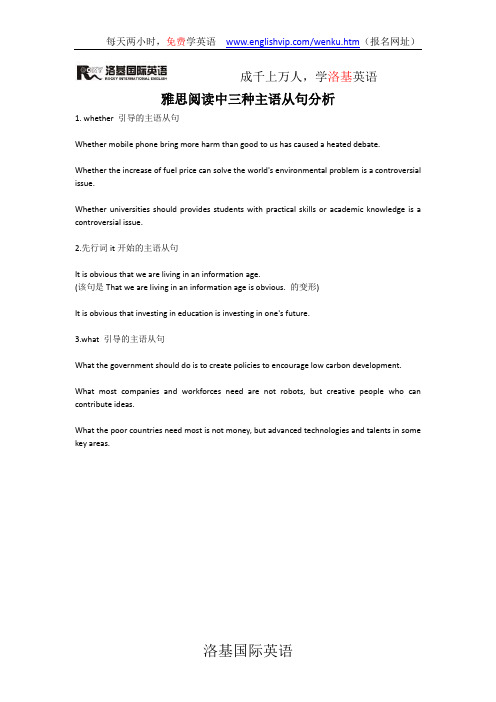
成千上万人,学洛基英语雅思阅读中三种主语从句分析1. whether 引导的主语从句Whether mobile phone bring more harm than good to us has caused a heated debate.Whether the increase of fuel price can solve the world's environmental problem is a controversial issue.Whether universities should provides students with practical skills or academic knowledge is a controversial issue.2.先行词it开始的主语从句It is obvious that we are living in an information age.(该句是That we are living in an information age is obvious. 的变形)It is obvious that investing in education is investing in one's future.3.what 引导的主语从句What the government should do is to create policies to encourage low carbon development.What most companies and workforces need are not robots, but creative people who can contribute ideas.What the poor countries need most is not money, but advanced technologies and talents in some key areas.“成千上万人疯狂下载。
雅思经典必背之表语从句
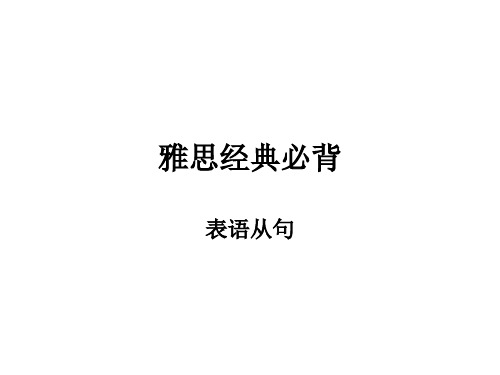
雅思经典必背
表语从句
一个迫切的问题是许多稀有物种正处于灭绝 的边缘 • • • • a pressing issue rare species be on the edge of extinction A pressing issue is that many rare species are on the edge of extinction.
• 这个问题是由多种原因引起的。一个主要 这个问题是由多种原因引起的。 原因是车辆增加的数量远快家车过多而公交车不 足。 • There are several reasons for…
• There are several reasons for this problem. • One of the main reasons is that the number of vehicles is increasing much more rapidly than the building of roads. • Another primary reason is that there seem to be too many private cars and not enough public buses.
• 近年来,关于时尚存在着广泛的争论。其 近年来,关于时尚存在着广泛的争论。 中一个问题就是一个人是否应选择他喜欢 的舒适的衣服,而不管是否时尚。 的舒适的衣服,而不管是否时尚。 • regardless of • There is a general discussion over fashion in recent years. • One of the questions under debate is whether a person should choose comfortable clothes regardless of fashion.
- 1、下载文档前请自行甄别文档内容的完整性,平台不提供额外的编辑、内容补充、找答案等附加服务。
- 2、"仅部分预览"的文档,不可在线预览部分如存在完整性等问题,可反馈申请退款(可完整预览的文档不适用该条件!)。
- 3、如文档侵犯您的权益,请联系客服反馈,我们会尽快为您处理(人工客服工作时间:9:00-18:30)。
雅思阅读中不容忽视的各种从句朗阁雅思考试研究中心朗阁雅思考试研究中心分析认为,关联词常有3个作用:连接作用,引导定语从句;代替先行词;在定语从句中担当一个成分。
关联词为关系代词和关系副词。
关系代词在定语从句中可以用作主语、宾语、定语等;关系副词在定语从句中只用作状语。
而其中定语从句(Attributive Clauses),在句中作定语,其作用是修饰主句的某个名词性成分,相当于形容词,所以又称为形容词性从句。
通常定语从句皆置于它所修饰的名词或代词之后,被修饰的名词或代词叫做先行词(antecedent),而引导定语从句的词称为关联词。
定语从句一般紧跟在其先行词之后。
★有时也可以与先行词分离。
★用作关联词的关系代词有that, which, who, whom, whose, as等,但朗阁雅思考试研究中心在此提醒考生们绝对没有“what”。
who, whom, whose指人,who是主格,在定语从句中用作主语(在非正式英语中也可以用作宾语,并且用作宾语时可以省去不用);whom是宾格,在定语从句中用作宾语(也可以省去不用);whose是属格,在定语从句中用作定语(有时也可以指物)。
★The man who he talked about is a professor.(在非正式英语中who代替了whom,也可以省去不用)★He doesn‟t like the girl whom you refer to.(宾格关系代词whom在从句中用作宾语,也可以省去不用)★The children whose parents give priority to work may feel lonely and alienated.(属格关系代词whose在定语从句中用作定语,指人)★The car whose wheels have been stolen was bought yesterday.(属格关系代词whose在定语从句中用作定语,指物,即car,可以用of which代替,但后者较为正式)That在定语从句中既可以用作主语,也可以用作宾语(在非正式文体中可省去);既可以指人,也可以指物。
如:★These methods include strength training that duplicate what they are doing in their running events as well as plyometrics, a technique pioneered in the former Soviet Union.(关系代词that在定语从句中用作主语,指物)★The students that hold a foreign degree seem to be more confident and independent.(关系代词that在定语从句中用作主语,指人)which在定语从句中既可以用作主语,也可以用作宾语;一般皆指物(在非正式文体中可省去)。
如:★Eye position in freshwater dolphins, which often swim on their side or upside down while feeding, suggests that what vision they have stereoscopic forward and upward.(关系代词which在定语从句中用作主语)★Those surveyed had experienced chronic illnesses, for which orthodox medicine had been able to provide little relief.(关系代词which在定语从句中用作宾语,可以省去)which在从句中也可以被用作定语和表语。
如:★His money had been stolen, which news annoyed him.(关系代词which在定语从句中用作定语)★They were completely mistrusted, which in fact, they were.(关系代词which 在定语从句中用作表语)关系代词在从句中用作介词宾语时,介词可以位于从句之首,也可以位于从句之末。
但以位于从句之首较为正式。
如:★This has been encouraged through programs of language classes fro children and through …apprentice‟ scheme, in which the endangered language is used as the medium of instruction to teach people a traditional skill.(关系代词which在定语从句中用作介词in的宾语,介词位于定语从句之首,即which之前)★This has been encouraged through programs of language classes fro childrenand through …apprentice‟ scheme, whi ch the endangered language is used as the medium of instruction to teach people a traditional skill in.(介词in位于定语从句之首,which在此可以省去)像during, except或者表示分割作用的of等介词通常放在关系代词的前面。
如:★The years during which he was away were long years to her.★He wrote many books, some of which you will read some day.关系代词who和that用作介词宾语时,介词须置于句末。
如:★The writer you referred to was an unknown writer.(关系代词who用作介词to 的宾语,介词to须位于定语从句之末,who在口语中可以省去)★This is the problem that he has been complaining about.(关系代词that用作介词about的宾语,介词about须位于定语从句之末)有时定语从句中还有其他成分,介词则位于定语从句之中。
如:This is the engineer who he cooperated with in the project.先行词指人时,关系代词既可以用who, 也可以用that。
但关系代词在定语从句中用作主语时,多用主格who。
如:★Beyond the practical need to make order out of chaos, the rise of the dictionaries is associated with the rise of the English middle class, who were anxious to define and circumscribe the various world to conquer.(persons, those, people等先行词多用关系代词who)★It is Tom who should be punished.(在强调结构中,指人时多用who)朗阁雅思考试研究中心分析认为,在下列情况中多用that, 而不用who或者which。
如:★much (很多)little (很少)none (没有任何)everything (任何事情)+先行词+thateverybody (任何人)nothing (没有任何)nobody (没有人)E.g. There is nothing in the world that can frighten him.★先行词前面有最高级形容词修饰时He is the most boring speaker that I have ever heard.This is the most interesting book that I have ever read.★先行词有以下代词或者有下列代词修饰时the firstthe lastthe onlythe same +先行词+thatthe veryallanynoevery★前面已经有疑问词who或者which时E.g. Who that knows him will trust him?Which of these trains is the one that goes to Nanjing?Which is the bike that you have lost?★兼指人和物/事物时E.g. The man and the horse that fell into the river were drowned.Look at the girl and her dog that are crossing the bridge.在下列情况中则多用which。
如:★离先行词较远时He told me the story of the craftsman which I narrated at the beginning of this book.★those + 复数名词之后You should buy one of those clothes which sell best.★which比较正式,非正式英语中也可以用thatSome water experts are now demanding that existing infrastructure be used in smarter ways rather than building new facilities, which is increasingly considered the option of last, not first, resort.★描述性定语从句一般用whichBeijing, which was China‟s capital foe more than 800 years, is rich in cultural and historic relics.as, than, but也可以用作关系代词。
如:★The project was completed on time, as was expected before.(关系代词as 在定语从句中用作主语,其先行词是前面的整个句子)★Tourism, holidaymaking and travel are these days more significant social phenomena than most commentators have considered.(关系代词than在定语从句中用作宾语,其先行词是social phenomena)★There are very few but admire his talents.(关系代词but在从句中用作主语,其先行词是few, but= who don‟t)用作关联词的关系副词有where, when, why等,when在定语从句中用作时间状语,其先行词是表时间的名词。
